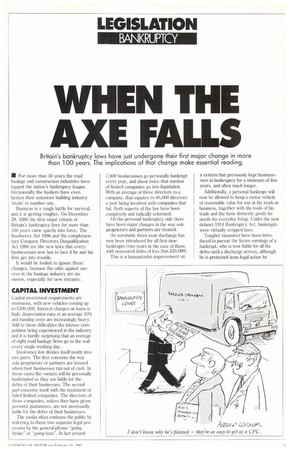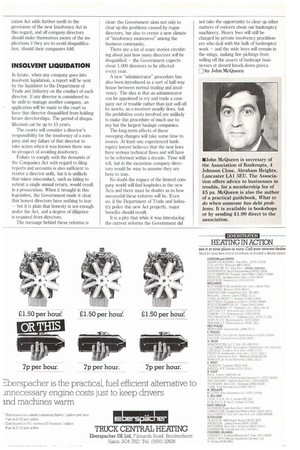WHEN THE AXE FALLS
Page 51

Page 52

Page 53

If you've noticed an error in this article please click here to report it so we can fix it.
Britain's bankruptcy laws have just undergone their first major change in more than 100 years. The implications of that change make essential reading.
• For more than 50 years the road haulage and construction industries have topped the nation's bankruptcy league. Occasionally the hauliers have even beaten their notorious building industry 'rivals' to number one.
Business is a tough battle for survival, and it is getting tougher, On December 29, 1986 the first major reform of Britain's bankruptcy laws for more than 100 years came quietly into force. The Insolvency Act 1986 and the complementary Company Directors Disqualification Act 1986 are the new laws that every businessman now has to face if he and his firm get into trouble, It would be foolish to ignore these changes, bemuse the odds against success in the haulage industry are immense, especially for new entrants.
CAPITAL INVESTMENT
Capital investment requirements are enormous, with new vehicles costing up to .£100,000. Interest charges on loans is high, depreciation runs at an average 10% and running costs are increasingly heavy. Add to these difficulties the intense competition being experienced in the industry and it is hardly surprising that an average of eight road haulage firms go to the wall every single working day.
Insolvency law divides itself neatly into two parts. The first concerns the way sole proprietors or partners are treated when their businesses run out of cash. In these cases the owners will be personally bankrupted as they are liable for the debts of their businesses. The second part concerns itself with the treatment of failed limited companies. The directors of those companies, unless they have given personal guarantees, are not necessarily liable for the debts of their businesses.
The media often confuses the public by referring to these two separate legal processes by the general phrase "going broke" or "going bust". In fact around 7,000 businessmen go personally bankrupt every year, and about twice that number of limited companies go into liquidation. With an average of three directors to a company, that equates to 40,000 directors a year being involved with companies that fail. Both aspects of the law have been completely and radically reformed.
On the personal bankruptcy side there have been major changes in the way sole proprietors and partners are treated.
An automatic three-year discharge has now been introduced for all first-time bankrupts (two years in the case of those with unsecured debts of less than .220,000).
This is a humanitarian improvement on a system that previously kept businessmen in bankruptcy for a minimum of five years, and often much longer.
Additionally, a personal bankrupt will now be allowed to keep a motor vehicle of reasonable value for use at his work or business, together with the tools of his trade and the basic domestic goods he needs for everyday living. Under the now defunct 1914 Bankruptcy Act, bankrupts were virtually stripped bare.
Tougher measures have been introduced to pursue the future earnings of a bankrupt, who is now liable for all his debts until a discharge arrives, although he is protected from legal action by creditors. The family home of a bankruptcy, often his last remaining major asset, will fall under the auctioneer's hammer much sooner. After 12 months, creditors interests in the family home will have priority: this overturns a previous set of safeguards that often enabled the families of bankrupts to hold on to their homes for a number of years. This harsh reform aims to provide a better opportunity for creditors to receive a dividend.
A whole new field of bankruptcy offences are introduced, such as concealing assets or failing to disclose debts. Virtually every financial transaction that a bankrupt has taken part in during the preceeding five years can be examined to see if it breaches these new regulations. If charged, the guilt of a bankrupt will be assumed and the onus will be on him to provide his innocence.
STRANGE QUIRK
The strange quirk in the law will remain whereby it is not an offence for a trader not registered for VAT not to keep business books, but it will be an offence if that same trader goes bust.
Personal bankruptcy will therefore remain a traumatic experience for those unfortunate to have to go through it, but its duration will be far shorter. Perhaps the most important reform for both debtor an creditor is a new system of voluntary arrangements, which may avoid the need for formal bankruptcy. Such arrangements were theoretically possible before, but technical and legal problems made them unworkable in practice.
Under the new system any debtor, sometimes following the intervention of a court, can present a proposal to creditors to sell assets or contribute future earnings to pay out a dividend. If three quarters (by money value) of unsecured creditors agree to such proposals they become legally binding on the remainder.
Creditors will get a higher dividend by avoiding the heavy costs of bankruptcy administration which have a prior claim on any assets. Debtors will avoid being made formally bankrupt, though they will have to surrender most of their assets.
This new system also offers creative opportunities for creditors to get together with debtors to save businesses — and jobs. Small road haulage contractors in trouble might well benefit from these arrangements. On the company side of insolvency law, the changes are equally comprehensive.
The advantage of a limited company in the past, and often the main reason for forming one, was that the directors of such companies were not personally liable for the debts of their businesses if they went into liquidation. The assets of a director, such as his house and car, were protected from the liquidator's grasp unless personal guarantees had been given. The directors of companies that went into liquidation were also free to start new companies immediately.
As a result, scandalous situations arose — common in road haulage — with directors leapfrogging from one failed company to another, to the detriment of customers and creditors alike. Under the new laws, directors who are found to have engaged in "wrongful trading" can be sued by the liquidators and made personally liable for all or part of their company debts. The precise meaning of the term wrongful trading is yet to be determined by the courts, but it is clear that directors of insolvent companies who continue to build up debts when they know their companies are insolvent are at risk.
Directors sued for wrongful trading can also be disqualified from holding directorships for prescribed periods. The first court actions have yet to take place, but clearly this change will be helpful to all those offering credit to limited companies with uncertain credentials. These provisions also apply to "shadow" directors who, though not formally associated with a company, are the real decision-making force behind it — particularly those rogues who set up innocent directors to front companies they intend to use fraudulently. The Company Directors Disqualifi cation Act adds further teeth to the provisions of the new Insolvency Act in this regard, and all company directors should make themselves aware of the implications if they are to avoid disqualification, should their companies fold.
INSOLVENT LIQUIDATION
In future, when any company goes into insolvent liquidation, a report will be sent by the liquidator to the Department of Trade and Industry on the conduct of each director. If any director is considered to be unfit to manage another company, an application will be made to the court to have that director disqualified from holding future directorships. The period of disqualification can be up to 15 years.
The courts will consider a director's responsibility for the insolvency of a company and any failure of that director to take action when it was known there was no prospect of avoiding insolvency.
Failure to comply with the demands of the Companies Act with regard to filing reports and accounts is also sufficient to render a director unfit, but it is unlikely that minor misconduct, such as failing to submit a single annual return, would result in a prosecution. When it brought in this legislation, the Government made it clear that honest directors have nothing to fear — but it is plain that honesty is not enough under the Act, and a degree of diligence is required from directors.
The message behind these reforms is clear: the Government aims not only to clear up the problems caused by rogue directors, but also to create a new climate of "insolvency awareness" among the business community.
'There are a lot of scare stories circulating about just how many directors will be disqualified — the Government expects about 1,000 directors to be affected every year.
A new "administrator' procedure has also been introduced as a sort of half-way house between normal trading and insolvency. The idea is that an administrator can be appointed to try and trade a company out of trouble rather than just sell off its assets, as a receiver usually does, but the prohibitive costs involved are unlikely to make this procedure of much use to any but the largest haulage companies.
The long-term effects of these sweeping changes will take some time to assess_ At least one experienced bankruptcy lawyer believes that the new laws have serious technical flaws and will have to be reformed within a decade. Time will tell, but in the meantime company directors would be wise to assume they are here to stay.
No doubt the rogues of the limited company world will find loopholes in the new Acts and there must be doubts as to how successful these reforms will be. Even so, if the Department of Trade and Industry police this new Act properly, major benefits should result.
It is a pity that while it was introducing the current reforms the Government did
not take the opportunity to clear up other matters of concern about our bankruptcy machinery. Heavy fees will still be charged by private insolvency practitioners who deal with the bulk of bankruptcy work — and the wide boys will remain in the wings, making fme pickings from selling off the assets of bankrupt businesses at absurd knock-down prices. El by John McQueen




















































































